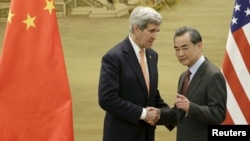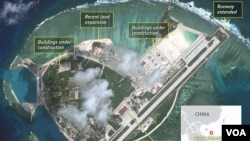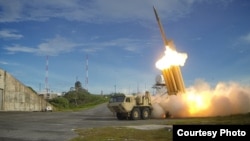China’s Foreign Minister will visit the United States to talk about East Asian territorial and defense issues.
U.S. Secretary of State John Kerry will host Chinese Foreign Minister Wang Yi for talks from Tuesday to Thursday.
The visit comes at an intense time in relations between the two powers. The U.S. and China face the issues of militarization and free navigation in the South China Sea.
They also face the issue of North Korea’s nuclear weapons and missile programs.
Last week, the U.S. said China had increased tensions by deploying missiles to a small island in the South China Sea. Vietnam and Taiwan also claim Woody Island in the Paracels Island group as their territory.
During a news briefing on Monday, a Chinese foreign ministry spokeswoman spoke to reporters. Hua Chunying was asked whether China’s missiles in the South China Sea would be discussed during the meeting.
She said, “the South China Sea is not and should not become an issue between China and the U.S.” She said the U.S. should, in her words, “stop hyping up” the issue.
Hua repeated the Chinese position that the island in question has been part of China since ancient times.
Hua added that, "China's deploying necessary, limited defensive facilities on its own territory is not substantively different from the United States defending Hawaii."
U.S. ships have carried out patrols in the South China Sea. China says the patrols increase tension in the area. The U.S. says it is securing freedom of navigation in the important trade route.
More than $5 trillion dollars in oil and goods pass through the sea each year.
On Monday, a top U.S. naval officer was reported as saying Australia and other countries also should carry out “freedom of navigation” naval operations. Such patrols would approach within 18 kilometers of the disputed islands.
China continues to build up the disputed island and others in the Paracels. State-owned China Southern Power Grid Company says it will set up a power management system on Woody Island. Chinese officials say the electrical system will be connected to 16 other islands in the area.
Foreign ministry spokesperson Hua also was asked about a possible UN Security Council resolution on sanctions against North Korea. She said the U.S. and China are in close communication on the Korean peninsula nuclear issue. She said China supports a resolution on North Korea.
However, Hua repeated China’s strong opposition to the possible deployment of the Terminal High Altitude Area Defense, or THAAD, missile system in South Korea. The U.S. high-technology system is designed to shoot down missiles.
I'm Mario Ritter.
Mario Ritter adapted this story from Reuters and other materials. Kathleen Struck was the editor.
________________________________________________________________
Words in this Story
militarization – n. to put weapons and military forces in an area
navigation – n. the activity of guiding a boat through an area of water
hype up – v. to talks or write about something in a way intended to get people excited or interested in something
substantively – adv. in an important, real or meaningful way
patrols – n. a group of people or vehicles that goes through an area to ensure it is safe or secure
sanctions – n. actions taken to force a country to obey international law, usually by limiting or stopping trade









